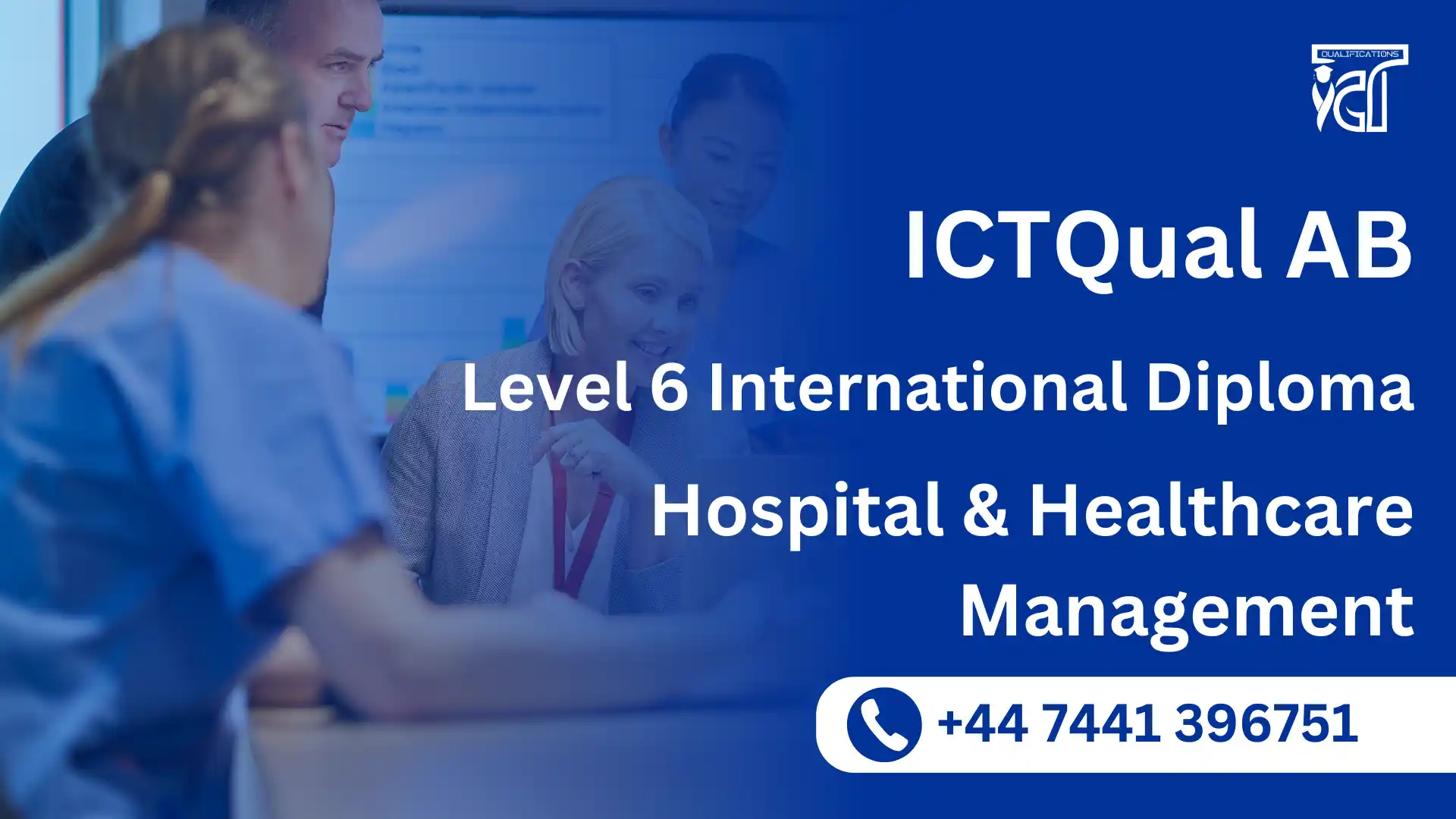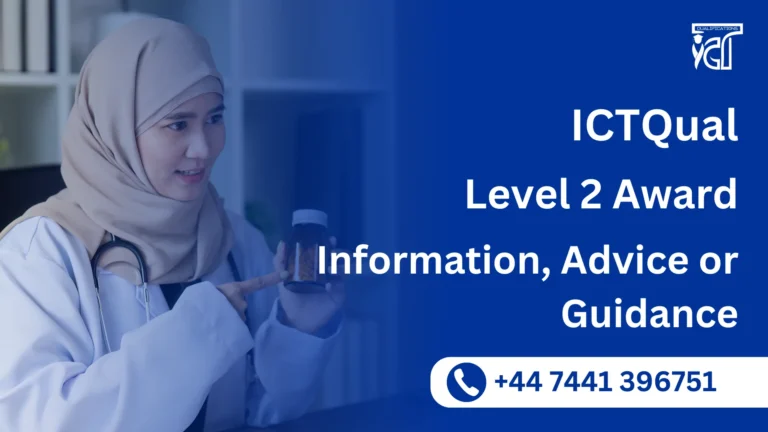The ICTQual AB Level 6 International Diploma in Hospital and Healthcare Management is a comprehensive qualification designed for learners who aspire to excel in leadership and operational roles within the healthcare sector. Whether you are a fresh learner aiming to enter healthcare management or a professional seeking to enhance your expertise, this three-year, 360-credit programme provides the knowledge, skills, and confidence required to thrive in today’s complex and evolving healthcare environment.
This diploma blends academic theory with real-world application, covering essential areas such as hospital administration, healthcare policies, financial management, quality assurance, and strategic planning. Learners will develop advanced decision-making, analytical, and leadership abilities while gaining insight into global healthcare trends and modern management practices.
Graduates of this programme will be well-prepared for a wide range of career opportunities, including Hospital Manager, Healthcare Administrator, Operations Coordinator, and Quality Assurance Officer across hospitals, clinics, government health agencies, and non-profit organisations. The curriculum is designed to ensure learners understand ethical practices, resource optimisation, and patient-centred care—skills that are highly valued across the healthcare industry.
Completing this diploma also creates a pathway for further academic progression, such as postgraduate study or specialist certifications in healthcare management and leadership. By mastering critical management skills and gaining a global perspective, learners will be equipped to drive positive change, improve healthcare delivery, and lead teams effectively.
The ICTQual AB Level 6 International Diploma in Hospital and Healthcare Management empowers learners to build a successful, future-ready career in one of the world’s most impactful and rapidly growing sectors.
ICTQual AB Level 6 International Diploma in Hospital and Healthcare Management
This qualification, the ICTQual AB Level 6 International Diploma in Hospital and Healthcare Management 360 Credits – Three Years, consists of 36 mandatory units.
Year 1: Foundation in Hospital & Healthcare Management
- Introduction to Psychology and Mental Health
- Human Development and Behaviour
- Fundamentals of Cognitive and Behavioural Psychology
- Introduction to Abnormal Psychology
- Principles of Counselling and Therapy
- Research Methods in Psychology
- Psychological Assessment Techniques
- Introduction to Neuropsychology
- Ethics and Professional Practice in Mental Health
- Communication Skills in Clinical Settings
- Health and Safety in Mental Health Environments
- Introduction to Stress and Coping Mechanisms
Year 2: Intermediate Hospital & Healthcare Management
- Strategic Planning and Decision-Making in Healthcare
- Advanced Healthcare Finance and Resource Management
- Human Resource Management in Hospitals
- Patient-Centred Care and Service Excellence
- Healthcare Operations and Logistics
- Risk Management and Compliance in Healthcare
- Project Management in Healthcare Settings
- Evidence-Based Practice in Healthcare Management
- Leadership Skills for Healthcare Professionals
- Healthcare Marketing and Communication Strategies
- Health Policy Analysis and Implementation
- Professional Development and CPD Planning
Year 3: Advanced Hospital & Healthcare Management
- Advanced Strategic Leadership in Healthcare
- Organisational Change and Innovation in Hospitals
- Advanced Healthcare Quality and Performance Improvement
- Healthcare Technology and Digital Transformation
- Financial Planning and Sustainability in Healthcare
- Crisis and Emergency Management in Healthcare
- Integrated Hospital and Clinical Services Management
- Advanced Project and Programme Management
- Healthcare Policy Development and Evaluation
- Research Project or Capstone in Healthcare Management
- Professional Ethics and Legal Considerations in Healthcare
- Advanced CPD and Career Development Strategies
Learning Outcomes for the Level 6 International Diploma in Hospital and Healthcare Management 360 Credits – Three Years:
Year 1: Foundational Knowledge
By the end of Year 1, learners will be able to:
Introduction to Healthcare Systems
- Explain the structure, functions, and roles of healthcare systems globally and locally.
- Analyse key components of hospital and healthcare delivery models.
- Apply foundational knowledge to understand healthcare service operations.
Principles of Hospital Management
- Understand core management concepts applied in hospital settings.
- Demonstrate the ability to plan and organise hospital activities efficiently.
- Analyse managerial challenges and propose solutions for effective operations.
Human Anatomy and Physiology for Managers
- Describe key anatomical and physiological systems relevant to healthcare management.
- Apply this knowledge to support clinical and administrative decision-making.
- Interpret health data with an understanding of human body functions.
Fundamentals of Health Policy and Legislation
- Explain the principles of healthcare policy development and implementation.
- Understand relevant healthcare laws and regulatory frameworks.
- Evaluate the impact of policies and legislation on hospital management.
Healthcare Quality and Safety Standards
- Identify quality improvement methods and safety standards in healthcare.
- Apply protocols to maintain patient safety and service excellence.
- Assess compliance with healthcare quality and safety regulations.
Introduction to Healthcare Finance and Budgeting
- Understand basic financial principles in hospital and healthcare management.
- Prepare and interpret budgets for healthcare services.
- Analyse financial data to support operational decision-making.
Organisational Behaviour in Healthcare
- Examine the behaviour of individuals and teams in healthcare organisations.
- Analyse organisational culture, motivation, and performance factors.
- Apply strategies to enhance teamwork and productivity.
Communication and Interpersonal Skills in Healthcare
- Develop effective communication strategies for clinical and administrative settings.
- Apply interpersonal skills to manage teams and patient interactions.
- Demonstrate clear and professional reporting and documentation.
Research Methods in Healthcare Management
- Understand research design, methodology, and ethical considerations.
- Collect and analyse data to support evidence-based decision-making.
- Apply research findings to improve healthcare management practices.
Health Informatics and Technology Basics
- Understand healthcare information systems and digital tools.
- Apply basic IT solutions for data management and clinical support.
- Evaluate the benefits and limitations of health technology applications.
Ethics and Professional Practice in Healthcare
- Apply ethical principles to decision-making and professional conduct.
- Understand legal responsibilities in healthcare practice.
- Demonstrate professionalism in administrative and clinical interactions.
Health and Safety in Healthcare Environments
- Identify workplace hazards and implement safety protocols.
- Apply risk assessment and control measures in hospital settings.
- Maintain a safe environment for staff, patients, and visitors.
Year 2: Intermediate Proficiency
By the end of Year 2, learners will be able to:
Strategic Planning and Decision-Making in Healthcare
- Develop strategic plans to improve healthcare service delivery.
- Apply decision-making frameworks to complex organisational problems.
- Evaluate outcomes of strategic initiatives for continuous improvement.
Advanced Healthcare Finance and Resource Management
- Analyse advanced financial data for operational and strategic decisions.
- Optimise resource allocation and cost management in healthcare settings.
- Apply financial planning techniques to ensure sustainability.
Human Resource Management in Hospitals
- Manage recruitment, training, and performance of healthcare teams.
- Apply policies for employee engagement and retention.
- Analyse HR strategies to improve organisational efficiency.
Patient-Centred Care and Service Excellence
- Implement practices that enhance patient experience and satisfaction.
- Develop systems to monitor and improve service quality.
- Apply patient feedback to enhance healthcare delivery.
Healthcare Operations and Logistics
- Manage operational processes within hospitals and healthcare services.
- Plan and coordinate supply chains, equipment, and facilities.
- Evaluate efficiency and effectiveness of operational workflows.
Risk Management and Compliance in Healthcare
- Identify and assess risks in hospital and healthcare settings.
- Develop mitigation strategies to ensure regulatory compliance.
- Implement risk management protocols for patient and staff safety.
Project Management in Healthcare Settings
- Plan, execute, and monitor healthcare projects effectively.
- Apply project management tools to achieve objectives within scope and budget.
- Evaluate project outcomes and implement improvements.
Evidence-Based Practice in Healthcare Management
- Apply research evidence to inform management decisions.
- Critically evaluate studies and data for applicability in healthcare settings.
- Integrate evidence into policies, procedures, and operational strategies.
Leadership Skills for Healthcare Professionals
- Demonstrate effective leadership in hospital and clinical teams.
- Apply conflict resolution, motivation, and delegation strategies.
- Evaluate leadership approaches to enhance organisational performance.
Healthcare Marketing and Communication Strategies
- Develop marketing plans to promote hospital services.
- Apply communication strategies for patient engagement and public awareness.
- Analyse the effectiveness of healthcare campaigns and outreach initiatives.
Health Policy Analysis and Implementation
- Critically assess health policies and their impact on hospital management.
- Implement policies in line with organisational goals and legal requirements.
- Evaluate the effectiveness of policy interventions.
Professional Development and CPD Planning
- Identify personal skills and development needs in healthcare management.
- Plan and implement CPD activities for career progression.
- Reflect on professional growth and performance improvements.
Year 3: Advanced Specialization and Application
By the end of Year 3, learners will be able to:
Advanced Strategic Leadership in Healthcare
- Develop and implement strategic initiatives in complex healthcare settings.
- Apply advanced leadership models to manage organisational change.
- Evaluate the impact of strategic decisions on hospital performance.
Organisational Change and Innovation in Hospitals
- Lead change management initiatives to improve healthcare delivery.
- Implement innovative solutions to organisational challenges.
- Assess the outcomes of change processes for continuous improvement.
Advanced Healthcare Quality and Performance Improvement
- Apply quality improvement frameworks to enhance hospital services.
- Analyse performance metrics and implement corrective actions.
- Evaluate patient outcomes to drive continuous service excellence.
Healthcare Technology and Digital Transformation
- Implement digital solutions to optimise clinical and administrative processes.
- Evaluate emerging healthcare technologies for efficiency and patient care.
- Integrate technology into strategic planning and operational workflows.
Financial Planning and Sustainability in Healthcare
- Develop long-term financial strategies for healthcare organisations.
- Apply budgeting and forecasting techniques to ensure sustainability.
- Evaluate financial performance and implement corrective measures.
Crisis and Emergency Management in Healthcare
- Plan and manage emergency response and disaster preparedness.
- Apply risk assessment and mitigation strategies during crises.
- Evaluate effectiveness of crisis management plans and procedures.
Integrated Hospital and Clinical Services Management
- Coordinate multidisciplinary teams and services for optimal care delivery.
- Implement integrated care pathways and service models.
- Assess operational efficiency and patient outcomes in complex settings.
Advanced Project and Programme Management
- Manage large-scale healthcare projects and programmes effectively.
- Apply advanced project planning, monitoring, and evaluation techniques.
- Ensure alignment of projects with strategic organisational goals.
Healthcare Policy Development and Evaluation
- Design and implement policies to meet healthcare objectives.
- Evaluate policy impact on operational, clinical, and financial outcomes.
- Apply evidence and stakeholder feedback to refine policies.
Research Project or Capstone in Healthcare Management
- Conduct an independent research project addressing real-world healthcare challenges.
- Analyse data, interpret findings, and propose evidence-based solutions.
- Present research outcomes in a professional and structured format.
Professional Ethics and Legal Considerations in Healthcare
- Apply ethical frameworks to decision-making in complex scenarios.
- Ensure compliance with legal and professional regulations.
- Evaluate ethical dilemmas and implement solutions aligned with best practices.
Advanced CPD and Career Development Strategies
- Plan and implement long-term career and professional development strategies.
- Identify opportunities for specialisation, leadership, and advanced roles.
- Reflect on practice to enhance skills, knowledge, and professional growth.
The ICTQual AB Level 6 International Diploma in Hospital and Healthcare Management offers learners a powerful mix of managerial expertise, industry knowledge, and strategic insight. This programme prepares learners to lead and innovate in today’s rapidly evolving healthcare sector.
1. Professional Growth and Career Development
- Gain a recognised Level 6 qualification valued across global healthcare and hospital management industries.
- Access diverse career opportunities such as Hospital Manager, Healthcare Administrator, or Operations Coordinator.
- Build strong credentials for leadership or senior supervisory roles within healthcare organisations.
- Strengthen eligibility for postgraduate studies or advanced healthcare management certifications.
- Develop leadership, communication, and organisational skills critical for long-term career success.
2. Advanced Healthcare Management Skills
- Learn to manage hospital operations, resources, and staff effectively.
- Gain expertise in healthcare finance, strategic planning, and quality assurance.
- Master decision-making, problem-solving, and analytical thinking for complex healthcare challenges.
- Understand healthcare policies, ethics, and regulatory frameworks at local and global levels.
- Acquire the ability to improve patient care through efficient systems and innovative management practices.
3. Global Relevance and Industry Demand
- Align with international standards in hospital and healthcare management.
- Enhance employability in a sector experiencing rapid global growth and transformation.
- Stay updated with modern trends, including digital health technologies and patient-centred care.
- Adapt skills to work within diverse healthcare systems and cultural settings.
- Meet the rising demand for qualified healthcare managers across both public and private sectors.
4. Flexible Learning and Long-Term Value
- Suitable for fresh learners and experienced professionals seeking to upgrade their expertise.
- Structured over three years with a 360-credit framework for comprehensive, in-depth learning.
- Encourages critical thinking, independent study, and practical application of management principles.
- Supports career stability and progression in a vital and ever-expanding industry.
- Provides a clear pathway to further study or specialist roles in healthcare leadership.
The ICTQual AB Level 6 International Diploma in Hospital and Healthcare Management is tailored for learners who aspire to make a meaningful impact in the healthcare sector through effective leadership and strategic management. This programme suits a diverse range of individuals who are motivated to grow professionally and contribute to improving healthcare delivery.
1. Aspiring Healthcare Managers
- Fresh learners seeking to begin a rewarding career in hospital and healthcare management.
- Individuals passionate about improving healthcare systems and patient care.
- Learners aiming to build a strong foundation in management within the healthcare sector.
- Students motivated by leadership opportunities in a fast-growing industry.
- Those looking for a recognised qualification to start a career in healthcare administration.
2. Experienced Healthcare or Administrative Professionals
- Healthcare workers, hospital staff, or administrators aiming to advance into managerial roles.
- Professionals seeking formal recognition of their skills through a Level 6 qualification.
- Practitioners looking to expand their knowledge of strategic planning and hospital operations.
- Individuals aspiring to transition from clinical roles into management or leadership positions.
- Learners wanting to update their expertise in line with modern healthcare practices.
3. Career Changers and Lifelong Learners
- Individuals from related fields such as business, public health, or social care transitioning into healthcare management.
- Learners eager to diversify their skills for greater employability and career flexibility.
- Professionals seeking stable, high-demand career opportunities in the healthcare industry.
- People with strong organisational and problem-solving skills who wish to make a societal impact.
- Lifelong learners committed to continuous professional development in a dynamic sector.
4. Globally Minded Learners
- Those interested in hospital management opportunities within international healthcare systems.
- Learners motivated to develop skills aligned with global healthcare standards and innovations.
- Individuals passionate about ethical, sustainable, and patient-focused management practices.
- People eager to contribute to healthcare improvement on a local, national, or global scale.
- Learners looking for a future-proof qualification to succeed in the evolving healthcare landscape.
Completing the ICTQual AB Level 6 International Diploma in Hospital and Healthcare Management opens a wealth of opportunities for academic advancement and career growth in the global healthcare sector. Learners gain the expertise and confidence to step into leadership roles or pursue specialised pathways.
1. Academic Advancement
- Progress to postgraduate programmes such as Master’s degrees in Healthcare Management, Public Health Administration, or Business Administration (MBA).
- Pursue specialist certifications in areas like quality assurance, digital health management, or healthcare leadership.
- Transition into research-focused roles or contribute to studies that improve hospital efficiency and patient care.
- Prepare for doctoral-level qualifications or advanced professional accreditations in healthcare leadership.
- Strengthen academic credentials for teaching, training, or mentoring roles in healthcare education.
2. Professional Career Opportunities
- Advance to positions such as Hospital Manager, Healthcare Administrator, Operations Director, or Quality Assurance Officer.
- Work within public and private hospitals, government health agencies, NGOs, and international healthcare organisations.
- Lead projects focused on hospital planning, policy development, or health systems improvement.
- Move into consultancy roles, offering strategic advice to healthcare providers and organisations.
- Take on supervisory or senior leadership positions, shaping healthcare delivery and policy.
3. Global Opportunities and Industry Demand
- Access international healthcare management roles in countries with rapidly growing healthcare systems.
- Apply knowledge to diverse healthcare environments and culturally varied patient populations.
- Engage in global health initiatives, digital transformation projects, or cross-border collaborations.
- Position yourself as a future-ready professional in a sector that continues to evolve and expand worldwide.
- Build a stable, long-term career in an essential and highly respected industry.
Entry Requirements
To enrol in the ICTQual AB Level 6 International Diploma in Hospital and Healthcare Management, learners must meet the following requirements to ensure they are prepared for the academic and professional demands of the programme:
1. Minimum Age
- Learners must be 18 years or older at the time of enrolment.
2. Educational Background
- Completion of a Level 5 diploma, equivalent qualification, or A-Level/High School diploma with relevant experience.
- A background in healthcare, management, business, or related fields is advantageous but not mandatory.
3. Professional Experience (Optional)
- Prior work experience in healthcare, hospital administration, or management is beneficial but not required.
- Fresh learners with a strong interest in hospital and healthcare management are encouraged to apply.
4. Language Proficiency
- Proficiency in English is essential to fully engage with coursework, discussions, and assessments.
- Learners whose first language is not English should provide proof of proficiency (e.g., IELTS 5.5 or equivalent) or demonstrate competency through previous education or professional experience in an English-speaking environment.
Register Now
Qualification Process
Qualification Process for the ICTQual AB Level 6 International Diploma in Hospital and Healthcare Management
- Self-Assessment:
Begin by evaluating your eligibility to ensure you meet the qualification requirements, including work experience, knowledge, and language proficiency. - Registration:
Complete your registration by submitting the required documents, including a scanned copy of a valid ID, and paying the registration fee. - Induction:
An assessor will conduct an induction to confirm your eligibility for the course and explain the evidence requirements. If you do not meet the criteria, your registration will be cancelled, and the fee will be refunded. - Assignments & Evidence Submission:
Provide all assignments and the necessary evidence based on the assessment criteria outlined in the course. If you are unsure of the required evidence, consult with the assessor for guidance on the type and nature of evidence needed. - Feedback and Revision:
The assessor will review your submitted evidence and provide feedback. Evidence that meets the criteria will be marked as “Criteria Met,” while any gaps will be identified. You will be asked to revise and resubmit if needed. - Competence Evidence:
Submit final evidence demonstrating that all learning outcomes have been met. This evidence will be marked as “Criteria Met” by the assessor once it is satisfactory. - Internal Quality Assurance (IQA):
The Internal Quality Assurance Verifier (IQA) will review your evidence to ensure consistency, quality, and compliance with standards. - External Verification:
The IQA will submit your portfolio to ICTQUAL AB External Quality Assurance Verifiers (EQA) for final confirmation. The EQA may contact you directly to verify the authenticity of your evidence. - Certification:
Upon successful completion of all checks, ICTQUAL AB will issue your official certificate, confirming that you have attained the ICTQual AB Level 6 International Diploma in Hospital & Healthcare Management.







